人教新课标高中英语必修5Unit3教案1
人教版新课标高中英语必修五 Unit 3 Life in the future Reading 配套练习 含答案详解
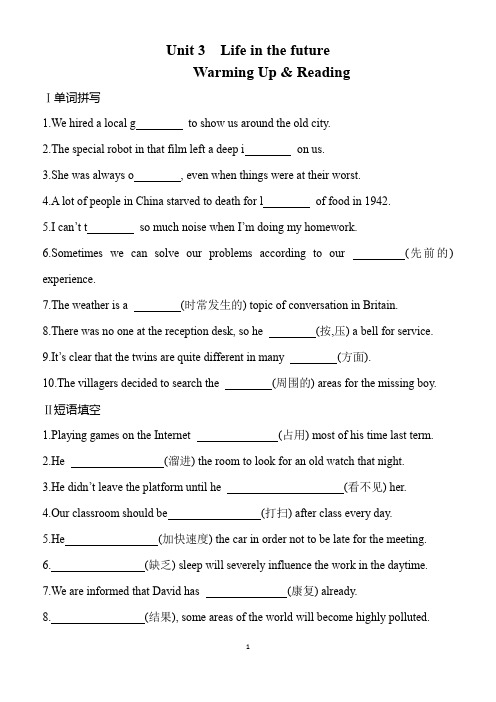
Unit 3Life in the futureWarming Up & ReadingⅠ单词拼写1.We hired a local g to show us around the old city.2.The special robot in that film left a deep i on us.3.She was always o, even when things were at their worst.4.A lot of people in China starved to death for l of food in 1942.5.I can’t t so much noise when I’m doing my homework.6.Sometimes we can solve our problems according to our (先前的) experience.7.The weather is a (时常发生的) topic of conversation in Britain.8.There was no one at the reception desk, so he (按,压) a bell for service.9.It’s clear that the twins are quite different in many (方面).10.The villagers decided to search the (周围的) areas for the missing boy.Ⅱ短语填空1.Playing games on the Internet (占用) most of his time last term.2.He (溜进) the room to look for an old watch that night.3.He didn’t leave the platform until he (看不见) her.4.Our classroom should be(打扫) after class every day.5.He(加快速度) the car in order not to be late for the meeting.6.(缺乏) sleep will severely influence the work in the daytime.7.We are informed that David has (康复) already.8.(结果), some areas of the world will become highly polluted.9.The film will (给……留下深刻印象) everybody who sees it.10.As soon as the man got home, he sat down and (打开) the TV. Ⅲ句型训练1.他在风雪中度过了7天,又冷又饿。
人教版英语必修五Unit 3单元整体教学教案
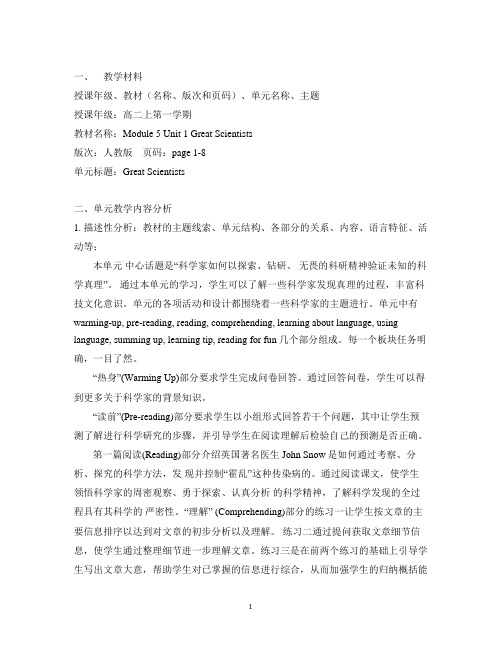
一、教学材料授课年级、教材(名称、版次和页码)、单元名称、主题授课年级:高二上第一学期教材名称:Module 5 Unit 1 Great Scientists版次:人教版页码:page 1-8单元标题:Great Scientists二、单元教学内容分析1. 描述性分析:教材的主题线索、单元结构、各部分的关系、内容、语言特征、活动等;本单元中心话题是“科学家如何以探索、钻研、无畏的科研精神验证未知的科学真理”。
通过本单元的学习,学生可以了解一些科学家发现真理的过程,丰富科技文化意识。
单元的各项活动和设计都围绕着一些科学家的主题进行。
单元中有warming-up, pre-reading, reading, comprehending, learning about language, using language, summing up, learning tip, reading for fun几个部分组成。
每一个板块任务明确,一目了然。
“热身”(Warming Up)部分要求学生完成问卷回答。
通过回答问卷,学生可以得到更多关于科学家的背景知识。
“读前”(Pre-reading)部分要求学生以小组形式回答若干个问题,其中让学生预测了解进行科学研究的步骤,并引导学生在阅读理解后检验自己的预测是否正确。
第一篇阅读(Reading)部分介绍英国著名医生John Snow是如何通过考察、分析、探究的科学方法,发现并控制“霍乱”这种传染病的。
通过阅读课文,使学生领悟科学家的周密观察、勇于探索、认真分析的科学精神,了解科学发现的全过程具有其科学的严密性。
“理解” (Comprehending)部分的练习一让学生按文章的主要信息排序以达到对文章的初步分析以及理解。
练习二通过提问获取文章细节信息,使学生通过整理细节进一步理解文章。
练习三是在前两个练习的基础上引导学生写出文章大意,帮助学生对已掌握的信息进行综合,从而加强学生的归纳概括能力,同时通过理解后的语言输出活动帮助学生更完整地理解文章。
高二英语必修五教案《Unit3Lifeinthefuture》

【导语】⾼⼆是承上启下的⼀年,是成绩分化的分⽔岭,成绩往往形成两极分化:⾏则扶摇直上,不⾏则每况愈下。
在这⼀年⾥学⽣必须完成学习⽅式的转变。
为了让你更好的学习⾼⼆频道为你整理了《⾼⼆英语必修五教案《Unit 3 Life in the future》》希望你喜欢! 教案【⼀】 本教学设计在新课程教学理念的指导下,⼒求在培养学⽣的语⾔知识、知识技能、情感态度、学习策略和⽂化意识等素养的基础上发展学⽣综合运⽤语⾔的能⼒,使学⽣通过观察、体验、探究等主动学习的⽅法优化英语学习⽅法,充分发挥⾃⼰的学习潜能,形成有效的学习策略。
1. 开展学⽣活动,发挥主体作⽤ 新课程强调要充分发挥学⽣在教学过程中的主体作⽤。
本课设计遵循以学⽣为主体,教师为主导这⼀教学原则,创设⾓⾊扮演情景、激烈讨论提出建议,让学⽣限度地参与教学过程,尊重学⽣的主体地位,充分发挥学⽣在学习过程中的主动性、积极性、创造性,使课堂充满活⼒。
2. 实施情景教学,统合三维⽬标 本课设计从教学需要出发,创设情景,进⾏情景设问、讨论,激起学⽣的情感体验,激活学⽣思维,帮助学⽣迅速、正确地理解和接受知识,并在学习过程中培养其积极进取的科学的⼈⽣观及价值观,较好地落实了三维⽬标。
⽽三维⽬标是相辅相成、相互渗透的,所以在情景教学的过程中,知识的落实、能⼒的培养、情感态度价值观的渗透交融在⼀起,实现了三维⽬标的和谐与统⼀。
3. 转变学习⽅式,增强教学效果 新课程要求提倡⾃主、合作、探究的学习⽅式,发挥学⽣的主体性、能动性和独⽴性,本课设计通过⾃学课本,⼩组讨论,综合分析,⾓⾊扮演等活动,为学⽣⾃主学习、合作学习、探究学习提供了空间,使学⽣体验了⾃主之乐,合作之趣,探究之悦,促进了学⽣知识的构建与运⽤,能⼒的培养和提⾼,情感体验和态度、价值观的形成,增强了教学效果。
4. 运⽤问题教学,启发学⽣思维 本课设计按照诱思探究理论要求,遵循学⽣的认知规律,引导学⽣去发现问题、分析问题和解决问题,从⽽掌握知识,形成能⼒,培养品质。
2021-2022学年人教版高中英语必修三教学案:Unit 5 Section 3 Word版含答案
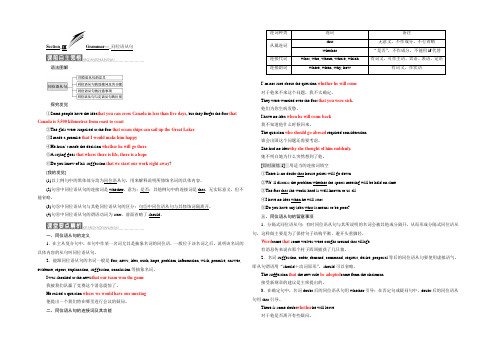
Section_ⅢGrammar—_同位语从句语法图解探究发觉①Some people have the idea that you can cross Canada in less than five days, but they forget the fact that Canada is 5,500 kilometres from coast to coast.②The girls were surprised at the fact that ocean ships can sail up the Great Lakes.③I made a promise that I would make him happy.④He hasn't made the decision whether he will go there.⑤A saying goes that where there is life, there is a hope.⑥Do you know of his suggestion that we start our work right away?[我的发觉](1)以上例句中的黑体部分均为同位语从句,用来解释说明所修饰名词的具体内容。
(2)句④中同位语从句的连接词是whether,意为:是否;其他例句中的连接词是that,无实际意义,但不能省略。
(3)句⑤中同位语从句与其他同位语从句的区分:句⑤中同位语从句与其修饰词隔离开。
(4)句⑥中同位语从句的谓语动词为start,前面省略了should。
一、同位语从句的定义1.在主从复合句中,在句中作某一名词尤其是抽象名词的同位语,一般位于该名词之后,说明该名词的具体内容的从句叫同位语从句。
2.能跟同位语从句的名词一般是fact, news, idea, truth, hope, problem, information, wish, promise, answer, evidence, report, explanation, suggestion, conclusion等抽象名词。
高中英语人教版必修三教学案:Unit 5 Section 3 含答案

[语法初识]后,说明该名词的具体内容的从句叫同位语从句。
2.能跟同位语从句的名词一般是fact, news, idea, truth, hope, problem, information, wish, promise, answer, evidence, report, explanation, suggestion, conclusion 等抽象名词。
The news that our women volleyball team had won the championship encouraged us all greatly.我国女排赢得冠军的消息大大地鼓舞了我们所有人。
He raised a question where we would have our meeting . 他提出疑问,我们将在哪里举行会议。
I don't like the idea that money is everything.我不喜欢金钱就是一切这一观点。
We have some doubt whether they can complete the task on time.我们怀疑他们能否按时完成任务。
We felt sad at the thought what he did and said.一想起他的所作所为我们就感到难过。
I have no idea when he will be back.我不知道他什么时候回来。
即时演练1句型转换①She works hard. The fact is well known to us all.→The fact that she works hard is well known to us all.②When will he start?I have no idea about it.→I have no idea when he will start.③The question is not clear. We need more time to do the work.→The question whether we need more time to do the work is not clear.1.分隔式同位语从句:有时同位语从句与其所说明的名词会被其他成分隔开,从而形成分隔式同位语从句,这样做主要是为了保持句子结构平衡,避免头重脚轻。
人教版新课标高中英语 2019-2020年 必修五 Unit 3 Life in the futur
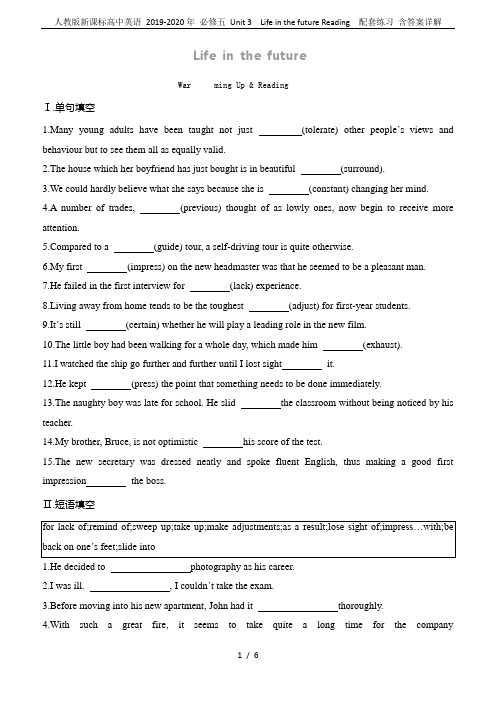
Life in the futureWar ming Up & ReadingⅠ.单句填空1.Many young adults have been taught not just (tolerate) other people´s views and behaviour but to see them all as equally valid.2.The house which her boyfriend has just bought is in beautiful (surround).3.We could hardly believe what she says because she is (constant) changing her mind.4.A number of trades, (previous) thought of as lowly ones, now begin to receive more attention.pared to a (guide) tour, a self-driving tour is quite otherwise.6.My first (impress) on the new headmaster was that he seemed to be a pleasant man.7.He failed in the first interview for (lack) experience.8.Living away from home tends to be the toughest (adjust) for first-year students.9.It´s still (certain) whether he will play a leading role in the new film.10.The little boy had been walking for a whole day, which made him (exhaust).11.I watched the ship go further and further until I lost sight it.12.He kept (press) the point that something needs to be done immediately.13.The naughty boy was late for school. He slid the classroom without being noticed by his teacher.14.My brother, Bruce, is not optimistic his score of the test.15.The new secretary was dressed neatly and spoke fluent English, thus making a good first impression the boss.Ⅱ.短语填空1.He decided to photography as his career.2.I was ill. , I couldn´t take the exam.3.Before moving into his new apartment, John had it thoroughly.4.With such a great fire, it seems to take quite a long time for the companyagain.5.Everyday´s sunshine will me that merry period belonging to you and me.6.I watched the plane go higher and higher into the sky until I it.7.Several research institutions were closed down fund.8.He the boss his sincerity and skills, which helped him to land a job immediately.9.He the classroom while the teacher was writing on the blackboard.10.Some schools will have to in the agreement with the new educational reform. Ⅲ. 句型训练1.School has started, but I feel more and more uneasy . (as if)学校已经开学,但我感觉越来越焦虑,似乎来到了一个陌生的地方。
英语人教版高中必修一(新课标)教案Unit 3 Reading and Thinking 教案

Unit 3 Sports and FitnessPeriod 2 Reading and Thinking教材分析本课时的活动主题是“选择你最喜欢的运动员”(Choose your favourite athlete)。
该文本属于杂志文章,有明显的标题特征、结构特征和语言特征。
文章创设的情境,即某杂志社请读者来信选举自己心目中的“体育界的活传奇”( Living Legends of Sports),在此基础上,使学生能够使用所学知识来评选自己心中的体育传奇明星,并且能够表达自己对“体育精神”的理解,目的是培养学生理性思考和客观评判的思维品质。
另外还应该从这些传奇人物身上领会和感悟做人和做事的道理。
教学目标1. 快速阅读获取有关郎平和乔丹的基本信息;深入阅读了解他们被称为体育传奇的原因。
2. 通过提问引导学生理解某些语言在文本中的含义,如“time seems to stand still, graceful…”等等。
3. 阅读并理解课文各部分的上下文,学习如何说和写sports legend。
4. 通过对比分析,形成判断传奇人物的标准,学会选择自己喜欢的传奇体育明星。
教学重难点【教学重点】1.深入了解郎平和乔丹的基本情况。
2.理解他们被称为sports legends的原因。
【教学难点】理解某些语言在文本中的含义,例如“time seems to stand still, graceful…”等等。
教学过程Step 1 Warming-upLook at some famous sports stars’ pictures and have a discussion about them.设计意图:引导学生欣赏著名运动明星的图片及讨论知名运动员及运动的功能,引出本单元话题,并对本课将要学习的两位运动员郎平和乔丹做好铺垫。
Step 2 Pre-reading1.Work on Activity 1. Look at the titles and pictures, and predict what the text is about.2.Brainstorm: What aspects will be involved when we talk about “living legends of sports”?设计意图:通过浏览图片、标题、小标题以及板式预测文本内容。
新人教版高一英语必修1-Unit 5 Period 3 教案

Useful Structures
Step 6
Let’s learn
Teacher shows the questions and asks students to answer.
Look at these sentences and underline the restrictive relative clauses. What kind of information does each clause communicate?
It was a time when people were dividedgeographically.
Emperor Qinshihuang united the seven major states into one unified country where the Chinese writing system began to develop in one direction.
When I started studying German, it was a struggle. The words felt strange on my tongue, and the grammar would not stay in my head. I told my mum that I wanted to give up, and that I would never live in a country __________ German was spoken. My mum told me that studying a language was not just for my future. It was exercise for the brain; the more I learnt of a language, the more my brain would grow. And I remember that day __________ I suddenly felt like German was no longer a foreign language. It felt like my brain had doubled in size. I had finally come to a place __________ I could think in this foreign language, and I could see the world from a different point of view. I felt as if I had reached the goal __________ I had been fighting for. I could open a book and see meanings, not just a sea of words. I finally understood the reason __________ my mum had encouraged me not to give up. Thanks, Mum!
人教版新课标高中英语 2019-2020年 必修五Unit 3 Life in the future
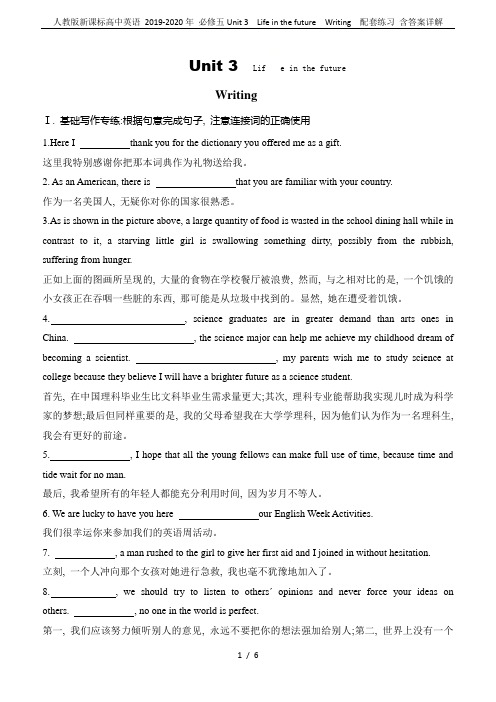
Unit 3Lif e in the futureWritingⅠ. 基础写作专练:根据句意完成句子, 注意连接词的正确使用1.Here I thank you for the dictionary you offered me as a gift.这里我特别感谢你把那本词典作为礼物送给我。
2. As an American, there is that you are familiar with your country.作为一名美国人, 无疑你对你的国家很熟悉。
3.As is shown in the picture above, a large quantity of food is wasted in the school dining hall while in contrast to it, a starving little girl is swallowing something dirty, possibly from the rubbish, suffering from hunger.正如上面的图画所呈现的, 大量的食物在学校餐厅被浪费, 然而, 与之相对比的是, 一个饥饿的小女孩正在吞咽一些脏的东西, 那可能是从垃圾中找到的。
显然, 她在遭受着饥饿。
4., science graduates are in greater demand than arts ones in China. , the science major can help me achieve my childhood dream of becoming a scientist. , my parents wish me to study science at college because they believe I will have a brighter future as a science student.首先, 在中国理科毕业生比文科毕业生需求量更大;其次, 理科专业能帮助我实现儿时成为科学家的梦想;最后但同样重要的是, 我的父母希望我在大学学理科, 因为他们认为作为一名理科生, 我会有更好的前途。
步步高人教新课标高二英语必修 5 Unit 3 Life in the future导学案
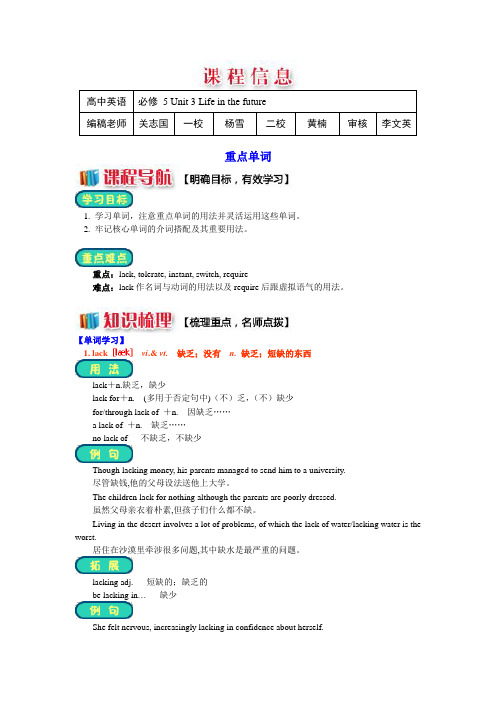
重点单词1. 学习单词,注意重点单词的用法并灵活运用这些单词。
2. 牢记核心单词的介词搭配及其重要用法。
重点:lack, tolerate, instant, switch, require难点:lack作名词与动词的用法以及require后跟虚拟语气的用法。
【单词学习】1. lack vi.& vt.缺乏;没有n. 缺乏;短缺的东西lack+n.缺乏,缺少lack for+n.(多用于否定句中)(不)乏,(不)缺少for/through lack of +n. 因缺乏……a lack of +n. 缺乏……no lack of 不缺乏,不缺少Though lacking money, his parents managed to send him to a university.尽管缺钱,他的父母设法送他上大学。
The children lack for nothing although the parents are poorly dressed.虽然父母亲衣着朴素,但孩子们什么都不缺。
Living in the desert involves a lot of problems, of which the lack of water/lacking water is the worst.居住在沙漠里牵涉很多问题,其中缺水是最严重的问题。
lacking adj. 短缺的;缺乏的be lacking in…缺少She felt nervous, increasingly lacking in confidence about herself.她感到紧张,对自己越来越没有信心。
She’s not usually lacking in confidence.她平时并不缺乏自信心。
Health problems are closely connected with bad eating habits and a ________ of exercise.A. limitB. lackC. needD. demand答案:B思路分析:句意:健康问题与不良的饮食习惯和缺少锻炼密切相关。
人教版英语必修五unit3教案教学设计

Unit 3 Life in the future教案教学设计Teaching Contents:Oral practice based on the reading passage on page17 to page18.1. Orally, answer several questions according to the text.2.Practise two topics:1) What do you suppose the future transportation will be like?2) Imagine where the house will be built in the future ?3. Listening and retelling.Teaching aims:1.Inspire the students to imagine the future life.2.Inspire the students to say something about the future transportation and housing.3.To improve the students’ oral ability.Teaching Important & difficult point::1.Inspire the students to imagine the future life and use the proper expressions.2.Enable the students to understand the meaning of the text, and say something according tothe text.3.To improve the students’ oral ability.Teaching methods:reading; asking and answering activity; pair or group work.Teaching Aids: A computer, multmedia.Teaching procedures:Step1: Lead-in .Enjoy a short video, cut from a science fiction film I, robot, to lead the students to imagine the future world. Step2: Fast ReadingAsk the students to read the text quickly, then find out the main idea of the text,and answer several questions according to each paragraph.purpose: These questionts are simple questions, just to help the students get a briefacquaintance to the future world described in the text.Step3: Listening and retelling according to paragraph 4. Show some tips to help the students retell the sentences.Purpose: This exercise is a practice for oral test part C in NCEE.Step4: Design two topics while talking about the hovering carriage and Wang Ping’s house.Practise the dialogues of making predictions.Topic 1: What do you suppose the future transportation will be like?Topic 2: Imagine where the house will be built in the future ?The students may use these structures :I suppose the transportation will be something like a ….I suppose , in the future, the house will be built in…..I imagine that ….Purpose: To practise the structure orally I suppose that… , I imagine that.. .Step5: Summary of the text orally.This passage mainly tells us about a boy named Li Qiang”s trip to the future. It tells us how he got to the future, how he felt and what he had seen.Step6: Discussion.“What’s the writer’s attitude towards the future, optimistic or pessimistic?”“How do you know? “The students may begin like these :•In my opinion, the writer’s attitude towards the future is _________ .•As far as I am concerned, the writer feels _________ to the future.•I think the writer has an _________ view of the future.Purpose: To learn to analyze the writer’s attitude and express your conclusion.Step7 Homework1. To talk with your chairmate on the topic:Imagine, what the future world will be?2. Review the reading passage and find out the difficult language points to you.3. Finish exercises 1,2&4 on page 19.4. Review the words and phrases of this unit. A dictation tomorrow.Display on the blackboardUnit 3 Life in the Futurewh- do you supp ose ….?I suppose …..I imagine that….And some words, perhaps they will be: science fiction film, high-tech, time tunnelPs: Display on the screen。
人教版新课标高中英语 2019-2020年 必修五Unit 3 Life in the future
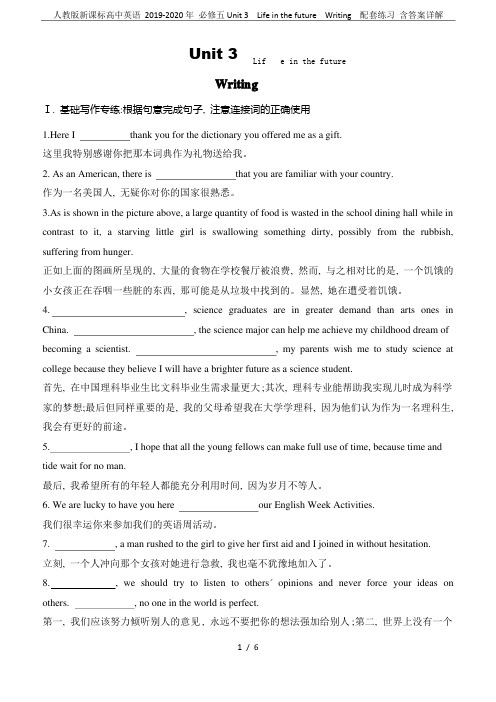
Unit 3Lif e in the futureWritingⅠ.基础写作专练:根据句意完成句子,注意连接词的正确使用1.Here I thank you for the dictionary you offered me as a gift.这里我特别感谢你把那本词典作为礼物送给我。
2. As an American, there is that you are familiar with your country.作为一名美国人,无疑你对你的国家很熟悉。
3.As is shown in the picture above, a large quantity of food is wasted in the school dining hall while in contrast to it,a starving little girl is swallowing something dirty,possibly from the rubbish, suffering from hunger.正如上面的图画所呈现的,大量的食物在学校餐厅被浪费,然而,与之相对比的是,一个饥饿的小女孩正在吞咽一些脏的东西,那可能是从垃圾中找到的。
显然,她在遭受着饥饿。
4.,science graduates are in greater demand than arts ones in China., the science major can help me achieve my childhood dream of becoming a scientist.,my parents wish me to study science at college because they believe I will have a brighter future as a science student.首先,在中国理科毕业生比文科毕业生需求量更大;其次,理科专业能帮助我实现儿时成为科学家的梦想;最后但同样重要的是,我的父母希望我在大学学理科,因为他们认为作为一名理科生,我会有更好的前途。
新课标人教版高中英语必修三全册教案

Unit 1 Festivals around the worldTeaching goals1. To help students learn to talk about festivals2. To help students learn to read festivals and celebrations.3. To help students learn to make phone calls, invitations and express “thanks”4. To help students learn to use some important words and expressions5. To help students identify examples of “The modal verbs”in the text TopicFestivals; how festivals began; how festivals are celebratedVocabularybeauty, harvest, celebration, starve, origin, religious, ancestor, Mexico, feast, bone, belief, trick, poet, arrival, gain, independence, independent, gather, agriculture, agricultural, award, rooster, admire, energetic, Easter, clothing, Christian, custom, worldwide, fool, permission, parking, apologize, drown, sadness, obvious, wipe, weep, remind, forgiveExpressionstake place, in memory of, dress up, play a trick on, look forward to, day and night, as though, have fun with, parking lot, turn up , keep one’s word, hold one’s breath, set off, remind --- of---Function1. Making phone calls: May I speak to ---? Can I ring/ call back later?Hold / Hang on, please. I’ll ring him/ her up again. Just a moment,please. Sorry, he / she isn’t here right now.2. Invitations: I wonder if you are inerested in--- I’d like to invite you to--- Would you like---? Could/ Would you please ---? I’m looking forwardto--- I’d love to, but----3. Thanks: Thank you so much. Thanks a lot. That’s very kind of you.You’re most welcome. Don’t mention it. It’s a pleasure. GrammarThe modal verbs (can,could, may, might, will, would, shall, should, must, can’t)Teaching AidsMultimedia facilities, tape-recorder, photos, tape-recorder, photos, diagramsPeriod OneProcedureStep1 Warming up⑴Warming up by Brainstorming holidays around the world.⑵Warming up by guessing which picture matches with which festival.⑶Warming up by discussing and listingStudents are required to work in groups and list three more Chinese festivals that they know. Discuss when they take place, what they celebrate and what people do at that time. Then tell the group which festival is his/ her favourite and why.Step 2 Pre-readingDiscussing and answeringAsk students to discuss and answer the two questions on P11) It is intended to help students bring their personal experience into the discussion of festivals.2) Students are directed to predict the content of the reading passage, based on the title and pictures.Step 3 Reading1.SkimmingAsk students to read the Ex1 on P3, have them understand four kinds of festivals, and then ask them to skim the reading passage. After reading, ask the whole class to fill the first line of the chart together. Then get them to finish the chart by themselves. At last, have three students tell the class his/ her answers.2. Scanning for the detailed information1) Ask students to Scan the passage and finish the true and false exercise.1. The ancient people needn’t worry about their food. F2. Halloween used to be a festival intended to honour the dead. T3. Qu Yuan was a great poet who people honour a lot in China. T4. Mid-autumn Festival is held to celebrate the end of autumn. F5. Easter celebrates the birth of Jesus. F2)Ask students to scan the passage again to find out the answers to the first three questions of the Ex2 on P3. And then ask one student to answer the questions and check with the whole class.Suggested answers:1.Festivals of the dead are for honouring or satisfying dead ancesters ancestors or others, who some people believe might return to help or harm living people.2.Auturn festivals are happy events because people are thankful that food is ready for winter and the hard farm work is finished.3. At spring festivals, people usually have dances, carnivals and other activities to celebrate the end of winter and the coming of spring.3. Discussion (group work)Ask students to discuss Question 4 and 5 in Ex2 on P3.Question 4Question 5The similarities:①The Chinese, Japanese and Mexican festivals of the dead all havecustoms to honour the dead.②The Chinese and Japanese go to clean their ancestors’graves,and the Mexicans offer food, flowers and gifts to the dead.The Difference:The Mexicans eat special food that looks like bones, something the Chinese and Japanese do not do.Step 4. Post readingHave students discuss in pairs which kinds of festival they think are the most important and which are the most fun.Period Two & Period ThreeLanguage focus1.be meant to : 应该, 得要,必须, 应做You are meant to leave a tip. 你得留下小费。
高中英语 Unit 3 Life in the future 语言学习练习课时教案 新人教版必修5

高中英语 Unit 3 Life in the future 语言学习练习课时教案新人教版必修5Knowledge aims:1: Learn and grasp some new words and expressions.2: Improve students ability of using the key words and phrases in sentences..3: Get all students to learn something more about UK.Ability Aims:Train the students’ of using the key words and phrases in sentences.Train the students’ ability of translationEmotional Aims:Train the students’ab ility to cooperate with others.Encourage the students to learn by t alking and discussing.一、根据括号中的解释,用课文中短语的适当形式完成句子。
1.The villagers went up into the mountain_______ (look for) the missing boy. 2.From all the evidence we can see that this case__________ (have some connection with) the previous one.3.If you can come and_________ (help sb. with) the housework,I will appreciate it.4.She waved until she_________ (can't see) the leaving ship.5.Your handbag ___________(look like) mine.6. We_________ (be short in) help these days so everyone has to work overtime. 7.He decided to quit the job because it____ (take,occupy) much of his spare time. 8.The car being traced_________ (go faster) and got out of sight.9.Mum and Dad spoke_________ (in a low voice) in order not to wake my baby brother. 10.Would you please____ (turn off) all the lights for me?1.searching for/in search of 2.is linked to3.assist/aid me with 4.lost sight of 5.is similar to6.are lacking in 7.took up/had taken up8.sped up 9.in whispers 10.switch off二,动词专练用所给动词的适当形式填空。
人教新课标高中英语必修5Unit3教案1

Unit3 Life in the FutureTeaching Goals:1.Predicting the good and bad changes in the future.2.imagine the alien creatures.Functions:1.做出预测(Making predictions)Do you suppose that…?Suppose that…I wonder if…Do you imagine that…? I imagine that…2. 猜测未来(Making conjectures about future)Is it likely/ unlikely that…Possibly …It is possible that …Most likely …I’m sure…Probably…Suppose that …Perhaps …Maybe …Grammar:1.过去分词作定语(The past participle as the attribute)I followed him to collect a hovering carriage driven by computer.Tomorrow you will be ready for some visits organized by computer.2.过去分词作状语(The past participle as the adverbial)Worried about the journey, I was unsettled for the first few days.Confused by the new surroundings, I was hit by the lack of fresh air.本单元以life in the future 为中心话题,旨在通过本单元的学习,让学生大胆发挥想象,对人类今后的生活环境,生活方式进行猜测,提倡环保生活意识,同时让学生学会过去分词作定语和作状语的不同用法,最后让学生将本单元所讨论的话题和推测手法结合,学习怎么样写report本单元所涉及的要点有:1.学习并了解未来生活的各个方面用与现在生活的不同之处,学习外星人的生活方式。
英语人教版高中必修一(新课标)教案Unit 3 Reading for Writing 教案

Unit 3 Sports and FitnessPeriod 5 Reading for Writing教材分析本单元我们从体育人物、体育竞技的角度讨论体育,而本课时为读写内容,要求学生从健康的角度探讨体育和人们日常生活的关系。
活动主题是“为健康手册编写一页内容”(Write a page in a wellness book)。
文章中描述了主人公健身前后的变化,并且收录在国外高中班级的健康手册中。
在阅读中要求学生理解文章,了解青少年应该具有的正确的健身态度和方式,学习比较和对比的写作方法。
同时,要求学生对自己的心理和身体健康进行反思,对比过去与现在或者将来的打算,培养关注健康的意识并形成正确的健康观。
教学目标1. To read and talk about the story of Kayla.2. To read for writing.3. To summarize the information and organization.4. To write a page for a class wellness book.教学重难点【教学重点】引导学生正确描述健康方面的问题和解决办法。
【教学难点】引导学生学会使用比较和对比的方法,描述事物前后的变化。
教学过程Step 1 Warming-up1. Free talking about health and fitness.(1) How do you keep fit?(2) List different ways of getting fit.设计意图:引导学生谈论自己的健身方法,并且提供图片以供同学讨论不同健身的方法,为引出本课时话题做好铺垫。
Step 2 Pre-readingWork in pairs. Guess what the passage is mainly about according to the theme of this unit and the title Going Positive.设计意图:通过小组活动,根据单元主题来预测文本内容的主旨大意。
人教版高中英语必修五unit3lifeinthefuture-reading

Comprehending
1Inpairsanswerthesequestions. 1)WhydidLiQianggointothe future?
LiQiangwentintothefuturebeca usehehadwonaprizethatgavehi matour.
2)Howdidhefeelwhenhelefthisown time?
7.Whatwastheairlikethere?Inwhat waydidpeopletheretravel? Theairseemedthinasifithadlittleoxygenlef t;peopletheretravelledinahoveringcarriag edrivenbycomputer.
Goodchanges Badchanges
Time travel
cantraveltodiff after-
erenttimesasyo effectsoftrav
uwish
el
canmoves Transport wiftly
disorganised; difficulttofin dway
Goodchanges Badchanges
“Timelag”meansapersongetsflashb acksfromhisprevioustimeperiod.
3.HowdidtheytraveltotheyearAD30 08? Inatimecapsule.
4.Whoguidedmytrip? MyfriendWangPingismygui detothefuture.
ached
ArrivinghomeLiwas__s_h_o_w_iendt
- 1、下载文档前请自行甄别文档内容的完整性,平台不提供额外的编辑、内容补充、找答案等附加服务。
- 2、"仅部分预览"的文档,不可在线预览部分如存在完整性等问题,可反馈申请退款(可完整预览的文档不适用该条件!)。
- 3、如文档侵犯您的权益,请联系客服反馈,我们会尽快为您处理(人工客服工作时间:9:00-18:30)。
Unit3 Life in the FutureTeaching Goals:1.Predicting the good and bad changes in the future.2.imagine the alien creatures.Functions:1.做出预测(Making predictions)Do you suppose that…?Suppose that…I wonder if…Do you imagine that…? I imagine that…2. 猜测未来(Making conjectures about future)Is it likely/ unlikely that…Possibly …It is possible that …Most likely …I’m sure…Probably…Suppose that …Perhaps …Maybe …Grammar:1.过去分词作定语(The past participle as the attribute)I followed him to collect a hovering carriage driven by computer.Tomorrow you will be ready for some visits organized by computer.2.过去分词作状语(The past participle as the adverbial)Worried about the journey, I was unsettled for the first few days.Confused by the new surroundings, I was hit by the lack of fresh air.本单元以life in the future 为中心话题,旨在通过本单元的学习,让学生大胆发挥想象,对人类今后的生活环境,生活方式进行猜测,提倡环保生活意识,同时让学生学会过去分词作定语和作状语的不同用法,最后让学生将本单元所讨论的话题和推测手法结合,学习怎么样写report本单元所涉及的要点有:1.学习并了解未来生活的各个方面用与现在生活的不同之处,学习外星人的生活方式。
2)学习表示预测,建议的的句型。
(3)学习过去分词作定语和状语的结构。
(4)学习写好“report”,以训练学生的逻辑思维及写作能力.Period 1Teaching Aims:1. Learn some new words and expressions.2. Help the students to talk about life in the past, at present and in the future.3. Enable the students to describe the life in the past, at present and in the future. Difficult and Important Points:Compare life in the past, at present and in the futureWhat is life in the future like? What changes will take place?Teaching Methods:1. First and careful reading,2. Asking and answering question activity3. Individual, Pair work & group workTeaching Procedures:Step 1 warming upTalk about how many changes there have been in the last one thousand years. And what changes we might expect to find in the next one thousand yearsStep 2: pre-reading1.Can you tell what problems people are facing today?2.what problems do you think people in the future will have overcome? Which ones will still be there or evenworse in AD3008?Key: 1The problem of population will be solved, have begun to Control the birth rate. 2The problems will be still there, and will even worse.3I don’t think so. Now scientists are trying their best todevelop new resources that human beings can make use of ,such as solar energy. In my opinion……step 3:fast readingRead the text for the first time and tell what the text is about?It’s an e-mail written by a man Who has taken up a trip to the future.2. Look at the following sentence, there are in wrong order, tell me the correct order for these sentenceA. We were transported into the future by a comfortable time capsule.B. I arrived a t Wang Ping’s home and everything in his house made me surprised.C.I won a travel to the year AD3008D. I have my first try to master a hovering carriage.Step 4 careful reading1.why did I have the chance to travel to the year AD3008?2. What is a “ time lag”?3. How did I feel when I was in the capsule?4who guides my trip?5.why did my guide give me some tables?6.who transported us to the future?Key 1. I took up the prize I won the year before.2. “Time lag” means a person gets flashbacks from his previous time period.3. The seats in the capsule are very comfortable.4. My friend Wang Ping is my guide to the future.5. The tablets could help me feel less nervous and uncertain6. Wang Ping’s parents’ company transported us to the future.1How did I feel as soon as I was transported to the future?After the writer was transported to the future, he was hit by the lack of fresh air.2.how did Wang Ping solve this problem?Wang Ping gave a mask to the writer and hurried him through to a small room nearby to have a rest.3.what do you think has caused this kind of problem?Now we are causing more and more pollution to the nature, this will cause serious problems to life in the nature. This may be the cause of the lack of fresh air in the future.1 What did Wang Pang’s house look like?His house is a large bright ,clean room. It had a green Wall, a brown floor and soft lighting .2 What was the green wall made of? What’s the purpose of building this kind of green wall?The green wall was made of trees. The leaves of the trees will provide much-needed oxygen to the house.3 How can you produce a TV set in Wang Pang’s house?You can just flash a switch on the computer screen and a TV set will rise from the floor.Sample answers Ex.2I think the writer has an optimistic view of the future. He was very excited when he traveled to the year AD 3008 an d couldn’t believe if was true. From this, we can see he is eager to go to the future. Though he was hit by the lack of fresh air,The 2nd periodTeaching aims:Learn expressions & phrasesLearn. language pointsDifficult and Important Points:1)Language points2)The usage of “take up and sweep”Teaching Methods:Presentation & PracticeTeaching Procedures:Step I RevisionHave a dictationStep II. Check the answersch eck the answers of yesterday’s homework (.Using Words and Expressions)Step three language point1. I still can’t believe that I am taking up my prize that I won last yearTake up 开始做,占用,选修a. When does the manager take up his job?b. he has take up art in collegec. He decided to take p photography as his career.开放思维:Take off 脱下,起飞Take over接管Take to 喜欢上,对…产生好感a. Helen always helps her mother even though going to school____ most of her dayA. Takes upB. makes up C .saves up D. puts up2.I have to constantly rub my eyes to remind myself that I have traveled to the year AD3008我得不断擦拭自己的眼睛来提醒自己,我已到了公元3008年Remind: to make someone remember something that they must doRemind sb about sth提醒某人某事Remind sb to do sthRemind sb that/ where/how3. As a result, I suffered from ‘time lag”As a result: because of something that has happened结果,由于…的结果e. g He worked hard, and as a result, he got promoted quickly.Suffer from: to experience 患有…为…所苦。
